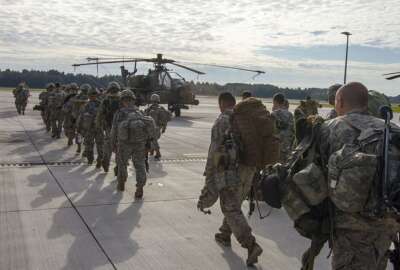
New bill could have your mailman double as your bartender
In today's Federal Newscast, House and Senate lawmakers seek to overturn a ban on the Postal Service shipping alcohol to households.
To listen to the Federal Newscast on your phone or mobile device, subscribe in PodcastOne or Apple Podcasts. The best listening experience on desktop can be found using Chrome, Firefox or Safari.
- House and Senate lawmakers seek to overturn a ban on the Postal Service shipping alcohol to households. Reps. Jackie Speier (D-Calif.) and Dan Newhouse (R-Wash.) introduced the USPS Shipping Equity Act, which would overturn laws on the books since Prohibition. Sen. Jeff Merkley (D-Ore.) is introducing companion legislation. The lawmakers said their bill would give USPS a chance to compete in a $24-billion-a-year industry.
- A top House Republican said federal employees should start returning to their offices. Rep. Jody Hice (R-Ga.) said prolonged telework isn’t sustainable in the federal government. He’s calling on the Office of Personnel Management to start preparing federal employees to come back to their offices. And he wants OPM to explain how permanent remote work policies might impact the government’s spending on things like federal property and locality pay. OPM said federal agencies remain in a maximum telework mode for now. (Federal News Network)
- The Department of Veterans Affairs is lifting mask requirements for fully-vaccinated employees, contractors and partners. VA Secretary Denis McDonough gave word Monday to employees. The mask mandate is still in place at all VA health care facilities. But Veterans Health Administration leaders will meet later this week to discuss the issue. VA has fully vaccinated over 290,000 health care workers.
- The military’s first scientific study on the COVID vaccine and active duty troops showed some disparities. A new medical study found gaps between race, gender, service and occupation when it comes to who in the military is getting the coronavirus shot. About 27% of the force is vaccinated. The Army is lagging behind with 21% of soldiers accepting the vaccine. The study also found that Black service members were 28% less likely to get the shot compared to their white counterparts. Women were 10% less likely to get the vaccine and 20% less likely if they already had COVID. The military is exhausting all avenues to try to get as many people as possible inoculated. (Federal News Network)
- The Air Force is allowing squadron commanders or their equivalents to make the call on whether airmen and civilians can telework or remote work. The change in policy is part of the Air Force’s new attitude toward telework after seeing how successful is was during the coronavirus pandemic. The new guidance states that even if a specific position is determined ineligible for telework, there still may be situations when telework is considered on an emergency or situational basis.
- More details emerged about how the SolarWinds attack impacted Defense contractors. While the Defense Department said it remains unscathed by the SolarWinds attack, the same cannot be said a few dozen of its contractors. Rear Adm. William Chase, the deputy principal cyber advisor in DoD, told Senate Armed Services Committee members that the Pentagon received 44 reports from 37 contractors who were exposed by the SolarWinds attack. Sen. Richard Blumenthal asked Chase for more details, saying, “44 reports of targeting or of successful intrusion?” Chase responded, “A mixture. Those are 44 reports of exposure the level of which I’m not prepared to go into here today.”
- The Defense Department released its first-ever technical guide to move the military toward a zero-trust approach to cybersecurity. The Defense Information Systems Agency developed Version 1.0 of the zero-trust reference architecture in collaboration with the DoD CIO, U.S. Cyber Command and the National Security Agency. The initial version is meant to make the case for why zero trust needs to replace perimeter defenses, and DoD components can start moving in that direction.
- The Army is making its Career Intermission Program a permanent part of its personnel system. The program lets soldiers pause their military service for any reason, like starting a family or going to college. During the intermission, they get full healthcare benefits and a small stipend. In return, they owe the Army two years of service for every year they take off.
- The Labor Department is offering five new workshops to help spouses of transitioning military members find work in their chosen careers. Spouses can attend the five workshops online, but only until Friday. They cover federal hiring, interview skills, how to bargain for salary, plus two for how to use LinkedIn. Labor’s Veterans Employment and Training Service will also hold in-person versions of the five classes later this month at Fort Campbell, Kentucky. It’s all part of the Vets Transition Assistance Program Labor operates along with the departments of Defense, Education, Homeland Security and Veterans Affairs.
- There will be new guidance in the coming weeks for how agencies can best to create inventories and use cases around artificial intelligence. The CIO Council is finalizing the new memo as part of its mandate under the Trustworthy AI executive order President Donald Trump signed in December. The order gave the council 60 days, which came and went in February, to create the process by which agencies should describe non-classified and non-sensitive artificial intelligence initiatives. Once the guidance comes out, agencies then have six months to publish their AI inventories of use cases.
- Agencies can now form labor-management councils with their federal employee unions. But it’s not a requirement. That’s the latest guidance from the Office of Personnel Management. OPM said it’s still reviewing a 2017 executive order from the Trump administration that rescinded formal labor-management councils. The Biden administration already restored official time and collective bargaining procedures via executive order back in January. OPM said this executive order is the first step toward resetting labor-management relations in the executive branch. (Federal News Network)
- A long running contract negotiation impasse between the Social Security Administration and its administrative law judges notched forward. The judges union said an independent arbitrator has ordered SSA negotiators back to the bargaining table, and reiterated that they’d bargained in bad faith. The agency tried earlier to impose 20 clauses of the unsigned contract, while nine other clauses are tied up in federal court. According to the union, the latest arbitrator ruling puts all 29 clauses back into play for negotiating.
- Bills giving more work to the Cybersecurity and Infrastructure Security Agency are headed for a full House vote. The House Homeland Security Committee passed the CISA Cyber Exercise Act, which would require the agency to stand up National Cyber Exercise Program testing response plans for major cyber incidents. The bill also requires CISA to provide model exercises to state and local governments to test the security of their critical infrastructure. The committee also passes the Cybersecurity Vulnerability Remediation Act. That would give CISA a year to report to Congress how it coordinates vulnerability disclosures.
Copyright © 2024 Federal News Network. All rights reserved. This website is not intended for users located within the European Economic Area.
Eric White
Eric White is news anchor and Federal Drive producer at Federal News Network.
Follow @FEDERALNEWSCAST
Related Stories
Getty Images/iStockphoto/kishore kumar

OMB looks to address AI transparency, consistency in upcoming guidance
Related Topics
Agency Oversight
All News
collective bargaining
Congress
cyber attacks
Cybersecurity and Infrastructure Security Agency
Dan Newhouse
Federal Drive
Federal Newscast
House of Representatives
Jackie Speier
Jeff Merkley
Jody Hice
Labor Department
labor-management relations
Management
Office of Personnel Management
Postal Service
Senate
SolarWinds
SolarWinds breach
telework
Tom Temin
zero trust




